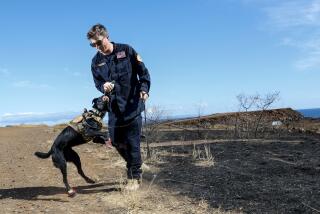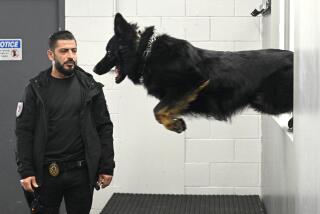William Putney, 83; Vet Trained War Dogs
- Share via
William W. Putney, a Marine Corps officer who trained and led war dogs during the World War II campaign on the Pacific island of Guam and wrote of their heroism in his popular book “Always Faithful,” has died. He was 83.
Putney died Tuesday of cancer at his home in Woodland Hills.
For the record:
12:00 a.m. March 30, 2003 For The Record
Los Angeles Times Sunday March 30, 2003 Home Edition Main News Part A Page 2 National Desk 1 inches; 39 words Type of Material: Correction
Putney obituary -- An obituary of Marine Corps veterinarian William W. Putney in the March 23 California section incorrectly stated that he earned a degree in veterinary science. His degree from Auburn University was a doctorate of veterinary medicine.
The retired veterinarian and former Marine captain always credited his wartime survival to a Doberman pinscher named Cappy and other canines he trained.
After the invasion of Guam in 1944, Putney was leading a patrol of men and three of his dogs to flush out Japanese soldiers hiding in caves on one of the surrounding islands.
“A shot rang out from the distance, and the dog right in front of me -- name of Cappy, a Doberman -- I saw him fly into the air. I could see the hole in his chest, he was dead,” the veterinarian told the Washington Post in 2000. “If it hadn’t been for Cappy right in front of me, I would have been the target.”
Putney said the dog’s handler “picked up the body and held it in his arms with blood all over his face -- he was crying, just rocking back and forth. He’d lost his buddy.”
Putney and his men buried 24 of the faithful Dobermans and German shepherds before they left Guam, but they never forgot their four-footed buddies.
When Putney made a return visit to the island in 1989, he discovered that the little war dog cemetery at Asan Beach had been wrecked by a typhoon in the 1960s, and the headstones and bodies moved inland. He found the new cemetery neglected and overgrown by the jungle.
Putney began a new campaign to honor the dogs, resulting in reburial with a 21-gun salute on the U.S. Navy base at Orote Point on July 20, 1994, in ceremonies observing the 50th anniversary of the invasion of Guam.
Many wondered why Putney made such a fuss.
“The reason is,” he said the week the new cemetery was dedicated, “these dogs lived in foxholes with their men. They went on and led over 350 patrols. Their handlers killed 301 enemy soldiers with the loss of only one of my men on patrols. So the fact that these dogs were killed instead of us and kept us from ever being ambushed or surprised at night makes them heroes in my mind.”
Putney, a native of Farmville, Va., who never lost his Southern drawl despite decades of practicing veterinary medicine in Woodland Hills, had already earned his degree in veterinary science from Auburn University in Alabama when he went through officers’ training at Quantico, Va. He was asked to organize a newly established war dog training school at what is now Camp Lejeune, N.C.
Dogs have been used in war since Roman times, and the tradition was followed in the U.S. during the Civil War and other conflicts. But the U.S. military conducted no formal training program until World War II. Putney helped pioneer training techniques that converted pets into scouts, messengers and sentries, and then returned them to pet status at war’s end.
Taking dogs recruited from families, Putney conditioned them to gunfire and other loud battle noise and taught them to warn of hidden enemies not by barking but by silently pointing their bodies or pricking their ears. He also trained dogs to deliver messages and sniff out land mines and trip wires.
After the war, Putney became chief veterinarian of the Marine Corps and desensitized the war dogs, turning them over to their original families or to their handlers for deserved pampering. Only four of the 559 still on the rolls in 1945 had to be destroyed because war had rendered them incorrigible and unfit pets.
Putney not only trained the war dogs, he gave them top medical care under fire.
On Guam, when Kurt, the first canine casualty, was struck by Japanese grenades, Putney tried to operate to cover his exposed spinal cord, and took him into his own foxhole. The dog died about 3 a.m., and Putney buried him -- under his commanding officer’s orders -- at Asan, the first of two dozen four-footed Marines to rest there.
“The dogs are finally getting the recognition they deserve,” Putney told The Times in 1994 when he helped place a granite plaque and bronze statue of a Doberman by Susan Bahary Wilner at the new Guam cemetery. “They weren’t just dogs. They were Marines that gave their lives bravely, and some of us are probably here today because of them.”
If it took the dogs a long time to achieve proper tribute, it took their champion even longer.
Although Putney was recommended for a Silver Star in 1944 for his own bravery on Guam, the medal inexplicably was not awarded. So his former commanding officer resubmitted the application, following the 1994 recognition Putney won for his dogs.
On Sept. 2, 1995, the medal finally was pinned on Putney at ceremonies in Hawaii’s Punchbowl commemorating the end of World War II.
According to the citation, Putney and his unit were defending the 3rd Marine headquarters on Guam on July 26, 1944, when the lieutenant, then 24, spotted a Japanese platoon heading toward the division hospital.
“Putney ordered the war dog handlers to tie their dogs to bushes and take up a firing line in the path of the enemy,” the citation states. “An enemy machine gun emplacement savagely opened fire.... Disregarding his own safety, [Putney] unhesitatingly arose from his position of cover, and standing exposed to the hail of bullets aimed at him, began firing.
“He succeeded in silencing the machine gun and killing the two enemy machine gunners. Although wounded, he exhorted the platoon to press the attack, resulting in the killing of all enemy soldiers, including the Japanese officer leading the attack.”
Putney remained loyal to his dog corps until his death. He published his book, “Always Faithful: A Memoir of the Marine Dogs of World War II,” in 2001.
The veterinarian also campaigned to rescind a military policy in effect from 1949 to 2000 to euthanize dogs following their military service.
Putney is survived by his wife, Betsy, of Woodland Hills; two sons, William of Oakland and James of Atlanta; and several grandchildren.
He will be buried at Quantico National Cemetery in Virginia.
More to Read
Sign up for Essential California
The most important California stories and recommendations in your inbox every morning.
You may occasionally receive promotional content from the Los Angeles Times.













